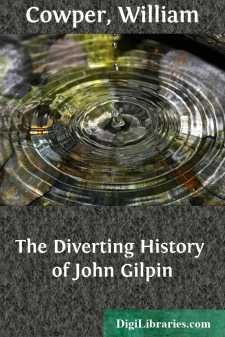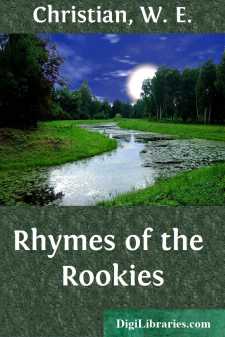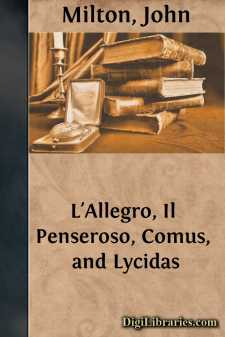Poetry Books
Sort by:
by:
William Cowper
John Gilpin was a citizenOf credit and renown,A train-band captain eke was heOf famous London town. John Gilpin's spouse said to her dear,Though wedded we have beenThese twice ten tedious years, yet weNo holiday have seen. To-morrow is our wedding-day,And we will then repairUnto the Bell at Edmonton,All in a chaise and pair. My sister and my sister's child,Myself and children three,Will fill...
more...
by:
Various
The Cat-tail Arrow BY CLARA DOTY BATES ittle Sammie made a bow, Well indeed he loved to whittle, Shaped it like the half of O— How he could I scarcely know, For his fingers were so little. As he whittled came a sigh: "If I only had an arrow; Something light enough to fly To the tree-tops or the sky! Then I'd have such fun tomorrow." Then he thought of all the slim Things that grow—the...
more...
by:
James Williams
Justinian at WindermereWetook a hundredweight of booksTo Windermere between us,Our dons had blessed our studious looks,Had they by chance but seen us.Maine, Blackstone, Sandars, all were there,And Hallam'sMiddle Ages,And Austin with his style so rare,And Poste's enticing pages.We started well: the little innWas deadly dull and quiet,As dull as Mrs. Wood'sEast Lynne,Or as the verse of...
more...
by:
W. E. Christian
MY BUNKIE He's mostly gnarls and freckles and tan, He'd surely come under society's ban, He's a swearin', fightin' cavalryman, But—he's my bunkie. He's weathered the winds of the Western waste. (You, gentle Christian, would call him debased) And he's loved at his ease and married in haste, Has my bunkie. In a...
more...
by:
John Milton
L'ALLEGRO HENCE, loathed Melancholy, …………Of Cerberus and blackest Midnight born In Stygian cave forlorn …………'Mongst horrid shapes, and shrieks, and sights unholy! Find out some uncouth cell, …………Where brooding Darkness spreads his jealous wings, And the night-raven sings; …………There, under ebon shades and low-browed rocks, As...
more...
FOREWORD Songs from a far-away world; a cry from another sphere. To those of us who once experienced the still and pitiless cold, a cry terribly suggestive of the horror-charged gloom, of the icy silence as unbroken as that of unfathomable deeps, of the stern and uncompromising individuality of a disturbed and vengeful North. Yet one is also reminded that, even in the Klondyke, in due season the...
more...
by:
M. E. S. Wright
COUPLETS If the grass grow in Janiveer,’Twill be the worse for't all the year. If Janiveer calends be summerly gay,’Twill be wintry weather till the calends of May. Winter thunder, and summer flood,Bode England no good. A bushel of March dust is a thingWorth the ransom of a king. A cold AprilIs the poor man’s fill. A wet Good Friday and Easter DayBrings plenty of grass, but little good hay....
more...
by:
Edith Campbell
MASTER WILLIE. There was once a little boy called Willie. I never knew his other name, and as he lived far off behind the mountain, we cannot go to inquire. He had fair hair and blue eyes, and there was something in his face that, when you had looked at him, made you feel quite happy and rested, and think of all the things you meant to do by-and-by when you were wiser and stronger. He lived all alone...
more...
by:
Richard Lovelace
INTRODUCTION. There is scarcely an UN-DRAMATIC writer of the Seventeenth Century, whose poems exhibit so many and such gross corruptions as those of the author of LUCASTA. In the present edition, which is the first attempt to present the productions of a celebrated and elegant poet to the admirers of this class of literature in a readable shape, both the text and the pointing have been amended...
more...
THE RUBAIYAT OF A HUFFY HUSBAND II wake, the Sun does scatter into FlightThe Dreams of Happiness I have each Night,O blessèd Dreams—full of Domestic Bliss,Too soon alas! They're banished with the Light. I'm going to tell in just the Briefest wayThe cause of all my Anguish—if I may—Then one and all will know the Reason whyMy Mien is Solemn, and I am not Gay. IIIOn Christmas day a good...
more...











